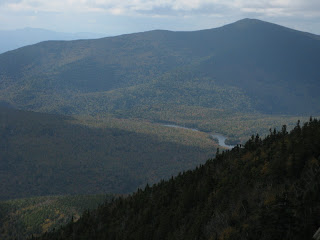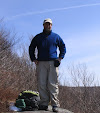Tuesday's forecast said there would be more sun to the south before late afternoon showers, and I had been meaning to return to the Blueberry Ledge Trail, so it was off to Wonalancet and a climb up Mt. Whiteface. The plan was to ascend via the Dicey's Mill and Tom Wiggin Trails, then the exciting upper section of Blueberry Ledge Trail, with its challenging ledge scrambles and magnificent view perches. I would then descend directly via Blueberry Ledge Trail, perhaps diverting to Blueberry Ledge Cutoff on the lower half. It turned out to be a terrific trek, though the lower half of the descent didn't go exactly as planned.
As I set off from Ferncroft, the bucolic trailhead that is the favorite of this and many another hiker, morning clouds were burning off Whiteface.

The Dicey's Mill Trail leads through a field by a house; a sign says "Hikers Welcome." Thanks go to these property owners for allowing hikers to use their land!
 Shortly after entering the woods you reach the Wilderness boundary. I paused here to pay tribute to George Zink, a wonderful guy and strong wilderness advocate who was known as the "father of the Sandwich Range Wilderness." George passed away this year after a long and accomplished life. Wonalancet will miss him.
Shortly after entering the woods you reach the Wilderness boundary. I paused here to pay tribute to George Zink, a wonderful guy and strong wilderness advocate who was known as the "father of the Sandwich Range Wilderness." George passed away this year after a long and accomplished life. Wonalancet will miss him.
After climbing up the "S" curve, the trail meanders up the peaceful valley of the Wonalancet River.
 At 1.9 miles I turned left on the lightly-used Tom Wiggin Trail. The Wonalancet Out Door Club has posted signs at each end of this trail to discourage incidental use: "Not Recommended Steep and Loose." This trail climbs 1450 ft. in 1.1 mile.
At 1.9 miles I turned left on the lightly-used Tom Wiggin Trail. The Wonalancet Out Door Club has posted signs at each end of this trail to discourage incidental use: "Not Recommended Steep and Loose." This trail climbs 1450 ft. in 1.1 mile.
It starts off by descending to cross the pretty Wonalancet River, which is really a mountain brook.

The Tom Wiggin Trail skirts the edge of The Bowl Research Natural Area, in which the forest had reportedly never been logged. The lower part of the trail ascends through a superb mature hardwood forest.
 There are some very large, old sugar maples in here.
There are some very large, old sugar maples in here.

Then the trail turns up the slope and climbs very steeply, with some slippery gravelly footing.

The last time I climbed this trail was a few days after the great Valentine's Day snowstorm of 2007. I was following the packed-out Dicey's Mill Trail when I noticed a snowshoe track veering off on Tom Wiggin. On a whim, I followed it. The track ended in 0.1 mile, but I decided to keep going. Having read of epic trail-breaking efforts after the storm (e.g. 7 hours for a large group to reach North Tripyramid), I wanted to partake in the fun. What a boneheaded decision! It took me four hours to climb the remaining mile on Tom Wiggin. Progress was measured in feet per minute. By the time I got to Blueberry Ledge Trail it was five o'clock, so the last part of the descent was in the dark.

There are no open views on Tom Wiggin, but you do get this framed view of Passaconaway.

At the top of the climb I turned right on Blueberry Ledge Trail, which traverses a gentle shoulder before starting the steep upper climb.

After a couple of easy scrambles, I reached the first viewpoint (3600 ft.), at the edge of a cliff looking SW to Sandwich Dome.

Just above here is one of the more difficult spots on the trail -a steep slab where there were once wooden steps pinned to the ledge. Someone had fastened a dog leash to a root as a climbing aid, but it was gone when I descended later in the day. The saving grace on these scrambles is that the Whiteface granite generally has good grip, unlike, say, the slabs on the Flume Slide Trail.

These drill holes are left from the former pin steps.

After another hand-and-foot clamber up ledges, I reached the first east-facing viewpoint, just to the right of the trail. I settled in here for a long break, admiring the classic view of Passaconaway across the glacial cirque known as The Bowl. The foliage was a few days from "peak" here, but there were some nice color bursts.
 The headwall of The Bowl, with a big rock slab near the top.
The headwall of The Bowl, with a big rock slab near the top.
The view east over the Wonalancet Range to Paugus and Chocorua.
 The Presidentials rise in the distance, above the rim of The Bowl.
The Presidentials rise in the distance, above the rim of The Bowl.
Farther up, after several more scrambles, is a flat ledge on the left where you look at the great south cliff, the "white face." Some historical sources say this resulted from a massive landslide in 1820.

I especially like the view of Flat Mountain Pond nestled river-like at the base of Sandwich Dome.

Southward is the great spread of Lake Winnipesaukee.

This ledge is ideal for sitting and snoozing, if you're so inclined.
 Still more scrambling brings you to the premier perch on Whiteface, a table-like crag on the right at 3900 ft.
Still more scrambling brings you to the premier perch on Whiteface, a table-like crag on the right at 3900 ft.
Passaconaway's southeastern satellites, Nanamocomuck Peak and Wonalancet Hedgehog, rise beyond the lower floor of The Bowl.


Sun and shadow on Passaconaway and the Bowl headwall.

After another lengthy viewing sojourn, I finally continued to the south summit of Whiteface, arriving about 2:45.

On the highest ledge you can barely make out a weathered triangle carved in the granite by the U.S. Coastal Survey in the early 1870s.
 A few yards down the McCrillis Trail are ledges with wide south views.
A few yards down the McCrillis Trail are ledges with wide south views. After a brief visit under darkening skies, I headed off on the Rollins Trail to bag the wooded true summit to the north.
After a brief visit under darkening skies, I headed off on the Rollins Trail to bag the wooded true summit to the north. In the col between the summits is the site of the former Camp Shehadi, which was deteriorating badly and was removed a few years ago.
In the col between the summits is the site of the former Camp Shehadi, which was deteriorating badly and was removed a few years ago.
An easy climb leads to the unremarkable summit, which is currently marked by a cairn.

Showers were moving in, and I hustled to get down below the tricky ledges before it began to rain. I did take the time to capture images for a few of the scrambles. The butt was definitely coming into play as a useful aid for descending.




It began to rain fairly hard after I was below the Tom Wiggin Trail junction. I did pull the camera out to record the new long series of rock steps built by the WODC trail crew this summer. If you hike often in the Sandwich Range, consider joining this excellent trail-tending club (www.wodc.org).

I was hiking down the trail with my travel umbrella. It may look dorky, but it sure keeps you dry, better than any raingear.

Here's where my trek took an unexpected turn. About 0.5 mile above the Blueberry Ledges (2.5 miles from the trailhead, elevation about 2400 ft.)), I thought I saw and heard hikers ahead, which seemed kind of odd at 4:45 pm. When I came around a bend, I looked ahead to see a large and unfriendly-looking bull moose staring back at me a short distance down the trail. His head was lowered and he was making a low moaning or groaning noise. For a split second I thought about grabbing a photo, but since it was raining the camera was in my pack. I quickly came to my senses and realized that taking the pack off was a very bad idea. I slowly backed up a few steps and headed left into the woods, hoping I could circle around him and re-emerge on the trail. The woods were open - too open to hide behind a tree, I thought - but my umbrella was catching on branches and I frantically tried to fold it up. When I was a little ways in I looked back and saw that the moose had advanced quickly up the trail and was now standing where I had just been, peering into the woods at me. I think he was turning to come after me. (My theory is that here, in the heart of the mating season, the sight of me holding the umbrella over my head may have triggered a burst of testosterone, as in "This dude has some strange big antlers, I gotta go kick his butt." I was once hiking on the Flat Mountain Pond Trail in the rain when I came upon a group of hikers with llamas. The leader asked me to lower my umbrella to avoid spooking the llamas. So apparently an umbrella can have an effect.) I've seen dozens of moose on and off the trail through the years (such as the one shown below on the Lincoln Woods Trail near the Osseo junction), and this was the first time I really felt threatened. I headed downhill, fast. Luckily the forest was open hardwoods, so I was able to make a quick getaway, getting thoroughly soaked by the underbrush. After I had descended a considerable distance, I stopped, looked and listened. No evidence of further pursuit. (I later read that when confronted by an angry moose, getting away fast is the best option, if possible; normally they won't pursue you very far.)
Now I wanted to get back to the Bluebery Ledge Trail, but I had gone a fair distance southeast and downhill. I tried angling downhill back the other way, but soon realized I would have to do some difficult sidehilling, or even climbing, to get back to the trail. Climbing, of course, would bring me back towards the moose. So I decided to keep whacking downhill, hoping to hit the Blueberry Ledge Cutoff; if I missed that, I would just descend to the Wonalancet River and proceed from there. The woods remained fine open hardwoods, and after a fairly long steady descent I did come to the stream. I followed the mossy brook for a quarter-mile downstream, through a beautiful open glen of hardwood and hemlock. A map check showed that from here I needed to climb away from the brook to get to the Cutoff. I slogged up over a hemlock ridge and dropped down to a small tributary, on the other side of which was the trail. I followed the Cutoff down to its lower junction with the Blueberry Ledge Trail. The unscheduled whack had taken well over an hour, thankfully in daylight and not by headlamp.
Blueberry Ledge Cutoff is one of my favorite "little" trails, with gorgeous woods and an idyllic stretch right along the brook. Much of it is on private land, but I read today in a publication called the "Wonalancet Irregular" (put out by the Wonalancet Preservation Association) that the landowners are donating the land to the National Forest - great news indeed! Here is a typical scene along this path.

Even with the long off-trail detour, I made it out before dark, concluding a very interesting day on Whiteface.






















